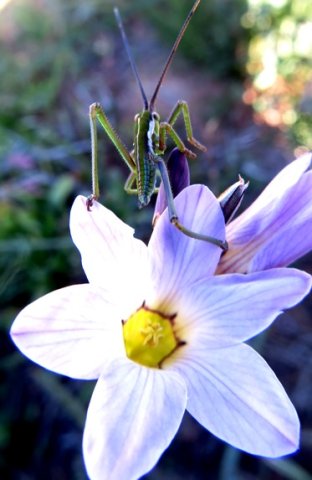Ixia rapunculoides tepal vein lines on both sides

Author: Ivan Lätti
Photographer: Thabo Maphisa
Faint dark veins may be visible on both surfaces of Ixia rapunculoides tepals as in the photo. The base of the perianth tube has more yellow colouring than the pale anthers positioned low in the flower due to their short filaments.
The visitor, by contrast, has long antennae for its size. Unlike anthers, antennae provide their insect with a sense of smell, possibly unrelated to procreation. Unless, of course, if those antennae should wave about in search of floral fragrance during this visit and accidentally pick up sticky grains of pollen for fertilisation to occur in another Ixia flower visited later.
This is after all what friendship is about, at least in some cultures of nature’s many species. The individual never lives forever in the way life manifests itself on earth. Individuals have to replace themselves through a range of arrangements mostly called sex for their species to survive as only option apart from giving up. The brainless dont even know how to give up.
And who says friendly collaboration in procreation may not find ingenious ways of crossing barriers among cultures and species? Life itself is after all the player, the species the pawns and the individual organisms of all kinds mere short-term incidentals in the game. The game? Breed, replace yourself because life is important, not its bits and pieces. Any morphing your kind should undergo along the way is incidental. Whats important, is the earth (and as many earths as can make it) to be covered in life of every conceivable kind.
Conception is a good thing, abundant in good times. It brings multiplication and then differentiation through adaptation and mutation into more kinds of life, more species, all to ward off attacks on life itself. Hard times bring sacrificing of individuals first and species second, in order for the reduced numbers of surviving species to push ahead again when the good times cycle returns.
Youre all here because life itself is protecting itself through all its specific options. Do your bit to the best of your ability to procreate and then die, not so much for the cause but because the baton is handed over and life drives the procreating echelons.
The game continues in the skins, scales, feathers, leaves, bark or petals of those that come after you and your equivalent, be it in the water, in the tree, the tree itself or somewhere over there on or under the rock.
Will there be a brain somewhere in the living mix later? Maybe, but more importantly there must be viable seeds of something, of many somethings to do something to live, somehow. So, there must be sex of whatever conceivable kind. Freud wasnt totally right, but he was necessary in recognising the Id as lifes representative in the species, in every species, the embodiment of the will to produce offspring at all costs, whenever possible.
Sublimation and curbing of this drive relegates a species to a lesser league in lifes forces; the weak must make way. The apparent paradox of humanity realising its breeding habit is excessive, is only a natural response in terms of its endowment of a brain informing of detrimental impact on survival expectations due to environmental damage and reduction of biodiversity as a consequence of effective human competition.
The brainy member of the earths living clan has to deal with this complexity on its own. For the rest the charge continues unabated in every other species. The slightly adapted strategy in humans serves to give the competition a breather if humanity is smart. The competition is here all extant species minus one, i.e. humanity.
Natural day clubs, night clubs and every moment clubs for cross-species procreation games should therefore be expected all over nature. Nightclubs are mere afterthoughts invented by people because they have these brain things. Hungry moths have been wise to such matters among flowers in the dark for ages. Until these candle things came along to spoil moth fun and complicate interspecies games at the licentious interfaces of nature’s many night-or-day clubs.
Wonder whether anybody will bet on this green customer contributing to the production of an I. rapunculoides fruit or two from this visit (Manning, 2007; Manning and Goldblatt, 1997; Eliovson, 1990; iNaturalist; JSTOR).

